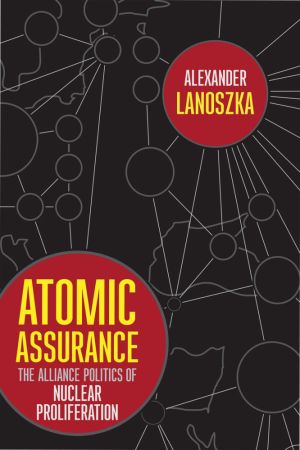Atomic Assurance
The Alliance Politics of Nuclear Proliferation
by Alexander Lanoszka
DescriptionTable of ContentsDetailsHashtagsReport an issue
Alexander Lanoszka finds that military alliances are less useful in preventing allies from acquiring nuclear weapons than conventional wisdom suggests. Through intensive case studies of West Germany, Japan, and South Korea, as well as a series of smaller cases on Great Britain, France, Norway, Australia, and Taiwan, Atomic Assurance shows that it is easier to prevent an ally from initiating a nuclear program than to stop an ally that has already started one; in-theater conventional forces are crucial in making American nuclear guarantees credible; the American coercion of allies who started, or were tempted to start, a nuclear weapons program has played less of a role in forestalling nuclear proliferation than analysts have assumed; and the economic or technological reliance of a security-dependent ally on the United States works better to reverse or to halt that ally's nuclear bid than anything else.
Crossing diplomatic history, international relations, foreign policy, grand strategy, and nuclear strategy, Lanoszka's book reworks our understanding of the power and importance of alliances in stopping nuclear proliferation. 






Book Description
Do alliances curb efforts by states to develop nuclear weapons? Atomic Assurance looks at what makes alliances sufficiently credible to prevent nuclear proliferation; how alliances can break down and so encourage nuclear proliferation; and whether security guarantors like the United States can use alliance ties to end the nuclear efforts of their allies.Alexander Lanoszka finds that military alliances are less useful in preventing allies from acquiring nuclear weapons than conventional wisdom suggests. Through intensive case studies of West Germany, Japan, and South Korea, as well as a series of smaller cases on Great Britain, France, Norway, Australia, and Taiwan, Atomic Assurance shows that it is easier to prevent an ally from initiating a nuclear program than to stop an ally that has already started one; in-theater conventional forces are crucial in making American nuclear guarantees credible; the American coercion of allies who started, or were tempted to start, a nuclear weapons program has played less of a role in forestalling nuclear proliferation than analysts have assumed; and the economic or technological reliance of a security-dependent ally on the United States works better to reverse or to halt that ally's nuclear bid than anything else.
Crossing diplomatic history, international relations, foreign policy, grand strategy, and nuclear strategy, Lanoszka's book reworks our understanding of the power and importance of alliances in stopping nuclear proliferation.
This open book is licensed under a Creative Commons License (CC BY-NC-ND). You can download Atomic Assurance ebook for free in PDF format (11.5 MB).
Table of Contents
Chapter 1
How Alliances (Mis)Manage Nuclear Proliferation
Chapter 2
American Security Guarantees during the Cold War,1949-1980
Chapter 3
West Germany, 1954-1970
Chapter 4
Japan, 1952-1980
Chapter 5
South Korea, 1968-1980
Chapter 6
Nuclear Proliferation and Other American Alliances
Book Details
Title
Atomic Assurance
Publisher
Cornell University Press
Published
2018
Pages
214
Edition
1
Language
English
ISBN13
9781501729188
ISBN10
1501729187
ISBN13 Digital
9781501729195
ISBN10 Digital
1501729195
PDF Size
11.5 MB
License

Related Books

This book, published to mark the 15th anniversary of the International Software Quality Institute (iSQI), is intended to raise the profile of software testers and their profession. It gathers contributions by respected software testing experts in order to highlight the state of the art as well as future challenges and trends. In addition, it covers...

This book analyses the interplay between governing, evaluation and knowledge with an empirical focus on Swedish higher education. It investigates the origins, logics, and mechanisms of evaluation and quality assurance reforms and their dynamic interactions with institutional, national and European policy contexts. The chapters report findings from ...

Modern C focuses on the new and unique features of modern C programming. The book is based on the latest C standards and offers an up-to-date perspective on this tried-and-true language.
C is extraordinarily modern for a 50-year-old programming language. Whether you're writing embedded code, low-level system routines, or high-performance ap...

Romania is an active player in various international higher education areas, while undergoing a series of higher education reforms within its national framework. The Higher Education Evidence Based Policy Making: a necessary premise for progress in Romania project was implemented by the Executive Agency for Higher Education, Research, Development ...

Bridging the gap between higher education research and policy making was always a challenge, but the recent calls for more evidence-based policies have opened a window of unprecedented opportunity for researchers to bring more contributions to shaping the future of the European Higher Education Area (EHEA). Encouraged by the success of the 2011 fir...

This book brings out the state of the art on how informatics-based tools are used and expected to be used in nanomaterials research. There has been great progress in the area in which "big-data" generated by experiments or computations are fully utilized to accelerate discovery of new materials, key factors, and design rules. Data-intensi...

